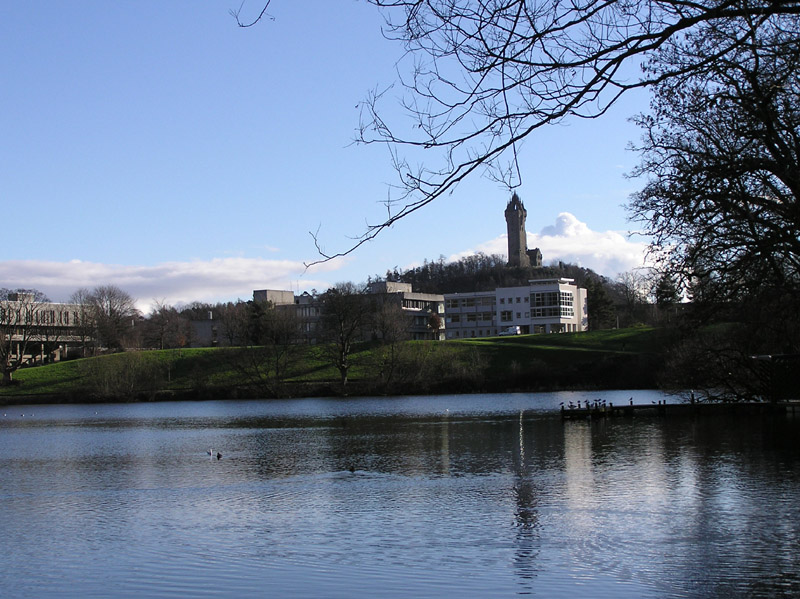University of Stirling
Stirling is an historic town and Scotland’s heritage capital where for 3 centuries the kings and queens of Scotland ruled. REQUEST INFORMATION
KEY INFORMATION:
Stirling has a population of approximately 45,750 and is situated in central, southern Scotland. The nearest station is at Bridge of Allan which is within walking distance of the University. The closest mainline station is at Stirling, just over two miles away.



UG 10300
PG 3800



Six steps to University of Stirling
Our method to your success
FREE CONSULTATION MEETING
REPORT & INSTITUTION SHORTLIST
APPLY & RECEIVE AN OFFER
WOO HOO! YOUR OFFER IS ACCEPTED
ARRIVAL & POST ARRIVAL SUPPORT
WE ARE WITH YOU EVERY STEP OF THE WAY
LOCATION:
The nearest airport is at Edinburgh, 29 miles from Stirling, which has over 100 daily international flights to many European destinations. There are direct flights from Edinburgh to Glasgow and London for connections to the USA, the Middle East and Asia. Stirling is 426 miles from London.The average low temperature in the Stirling area is between -.9 to -.3.4 degrees in January and the average high temperature is approximately 18.5 degrees in July.
REQUEST INFORMATION..

Request Information - University Courses
HISTORY:
The University of Stirling was founded by Royal Charter in 1967, making it the first new university in Scotland for over 400 years.Since the University of Stirling opened in 1967 on a greenfield site outside the town it has grown into a major research centre, with a large science park located immediately adjacent to the main university campus. Known as Innovation Park, the science park is now home to 40 companies engaging in various forms of research and development.
LOCATION:
The main campus is approximately two miles from the city of Stirling, but is much closer to the town of Bridge of Allan. The campus was formerly the estate of Airthrey Castle and the castle building is now part of the teaching facilities and offices.Learning, living and socialising for students takes place primarily in the community environment of the single campus. Bridge of Allan is the nearest town and can be reached in approximately 15 minutes by foot. Bus transport is available for students travelling to Bridge of Allan and Stirling town centre.
RANKING:
University of Stirling is ranked between 301st-350th in the Times Higher Education rankings. Stirling is ranked 801-900th in the Shangai Jaio Tong rankings and is not a member of the Russell Group of universities.University of Stirling is ranked 26th in the National Student Survey Satisfaction rankings.
INTERNATIONAL:
Stirling has over 2,800 international students from more than 120 countries studying at the university. This number represents about 20% of all students.
SIZE:
Stirling has a total student population of over 14,000 students. Around 10,300 are undergraduate and around 3,800 are postgraduates.
EMPLOYMENT:
97.1% of Stirling university graduates enter directly into work, further study or training within 6 months of graduation (source:HESA). A breakdown of post graduation employment by course, showing the split into professional/managerial positions, rather than general employment figures, is available from Unistats an independent source of university data. For more information, please visit the REF Information page.
FACILITIES:
There are more than 60 student societies at the University of Stirling, including Philosophy, Creative Writing; Debating, Video Games and E-Sports, Medieval History and Business.The Atrium in the Andrew Miller Building has several retail outlets including a bookstore, general store, food shops and a bank. Due to its central location, the Atrium is the principal hub for most day-to-day campus activities and it links the library and the Student Union Centre as well as having connecting bridges to on-campus student residences.One of the University’s founding principles was that art should be part of the everyday cultural experience and this led to the opening of the MacRobert Arts Centre. This is a small theatre and cinema complex and is open both to members of the University community and to the general public. The University of Stirling has its own fine art collection comprising over 300 works including paintings, tapestries and sculpture.Stirling is a major centre of sports training and education in Scotland. University students can participate in a variety of activities including swimming, football, golf, taekwondo, tennis, rugby, triathlon and rowing. Three purpose built sports facilities are located on campus: the headquarters of the Scottish Institute of Sport; the Scottish National Swimming Academy and the Gannochy National Tennis Centre. The University of Stirling also has its own 9-hole golf course and driving range.
ACCOMMODATION:
There are a number of student Halls of Residence located on-campus offering self catering accommodation for all first year undergraduates and many students in later study years, the lowest price for a single bedroom with shared bathroom and kitchen is £84.00 per week.There is no catered university accommodation.
COST:
International
International undergraduate tuition fee examples - BA or BSc: Fees for full time undergraduate courses start at £15,900 for most Arts & Humanities, Business related subjects, and Maths, rising to £18,800 for Laboratory based subjects like Biology and Engineering.
SUBJECT AREAS:
REF (Research Excellence Framework) was an independent government review conducted into the quality of research at UK universities and published in December 2014. This information highlights subjects of specialism within each university. We have listed all subject areas where at least 60% of the research conducted in these specific fields has been graded 3 or 4 stars. (4 stars being the highest ranking REF award). For more information, please visit the REF Information page.
ONLINE COURSES:
The University of Stirling offers a number of postgraduate programmes by distance learning. These include: MSc Advancing Practice, MSc Big Data, MSc Business Analytics, MSc Data Science for Business, MSc Dementia Studies, MSc Global Ageing, MPH Public Health, MSc Sport Nutrition, MSc Sport Performance Coaching, MSc Strategic Public Relations, and MSc Teaching English to Speakers of Other Languages.
LIFE AT University of Stirling
We have been helping overseas students gain entrance to University of Stirling for a number of years now, progressing to high profile careers in the UK. Find out more about this school below.
Review
Coming Soon
 LOOKING FOR AN ONLINE COURSE?
Our team can help you find a relevant course for your study.
BOOK A CALL
LOOKING FOR AN ONLINE COURSE?
Our team can help you find a relevant course for your study.
BOOK A CALL
DOWNLOAD YOUR FREE GUIDE TO A QUALITY UK EDUCATION
Sign up to our free Newsletter and you'll get a free copy of our guide to accessing a UK education to help you navigate the entire process.
REQUEST INFORMATION..
Get free instant access to exclusive content and join our monthly email guide
We’re with you every step of the way and will keep you updated on the latest UK education news. Find out more about joining.
